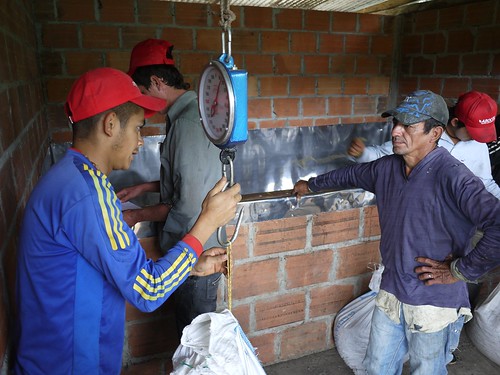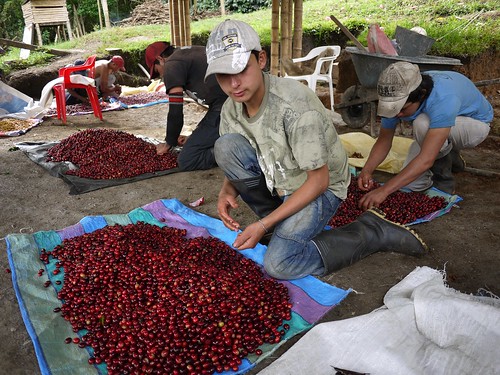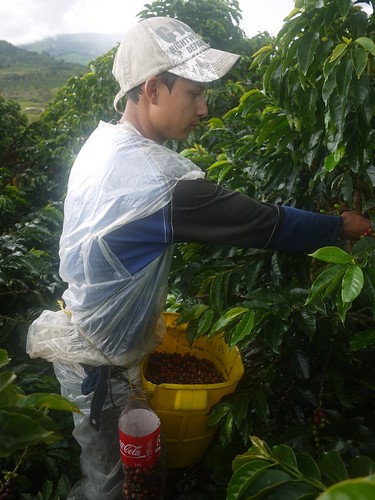I spent the whole Monday and Tuesday morning at Finca Tamana this week. The goal was to train the pickers to do a better job as well as documenting the extra spending and to see if the pickers actually made more money by doing a better job, otherwise I think I would get in trouble with the pickers.
I am very aware that Elias is in a financial squeeze. Still he seems to be committed to do all the measures necessary to improve quality, and that shows that he really believes in this project.
We are basically offering 1000 pesos more per arroba (12,5kg of cherry) for the pickers to sort out overripe, unripe and green cherries. This seems to work really well. The volumes are not down a lot and the pickers are already earning 5000 pesos more on average per day (USD 2,8. This is a 20% increase in salary per day.) The cherry delivery also looked a lot better than normal on Monday. Still there was room for improvement.
I decided to pick coffee for a couple of hours to see how difficult it was to separate semi ripe, unripe and over ripe from the ripe cherries, and it turned out it was more difficult than I thought. A lot of the cherries looks ripe from the top, but when you twist them they may still be unripe on the bottom. I managed to pick about 10 kg in 2 hours. (approximately 1,5 kg clean green quality coffee) A normal picker would do between 20 and 30 kg in the same time.
During the wrap up meeting with the pickers on Monday afternoon, I suggested to add an extra bag on the side of the cherry bucket where the red cherries are collected. Each picker would then be able to separate the bad cherry from the good in a more efficient way by putting it in the extra bag. They would then spend less time sorting out the bad cherry from the good on delivery of the cherry which means they will get more time in the field to pick coffee. They all seemed to be positive to this idea, and tuesday morning we already saw a big improvement both in efficiency as well as cherry uniformity and quality on the first delivery. (One of the pickers had made a creative solution by cutting a coke bottle in half and using it as an extra bucket. I decided to buy cokes for everyone so they all could do this.)
The pickers were much more confident and happy with this solution, as one of the hardest things to get them to do was proper sorting of cherries before the coffee was delivered to the receiving tank. The sorting involves sitting on the ground and picking out bad cherries from a pile of cherries. This seems to be quite inefficient and even though this is a part of the reason why we pay them more, it steals time both from their breakfast and lunch as well as they are loosing some time where they could be picking more coffee. As pickers are payed by the volume they pick, it is important to make them both efficient and quality focused.
Another problem we found a solution to was that we were a bit worried the pickers would throw the bad cherries on the ground in the field. This can increase broca population at the farm (a beetle that eats coffee beans) as they lay their eggs in the cherries that fall to the ground. We therefore decided to weigh the bad cherries together with the good cherries and pay the same price for both. This way the pickers don’t loose money and they seemed to be better at picking up cherries from the ground as well.
In the evening we started implementing a better washing technique that involves a mid rinse and soaking. I will write about this in the next post.




